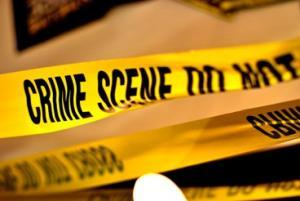The Virginia State Trooper shot and killed at the Greyhound Bus Station in Richmond, Virginia, last week died while on a drug war training exercise aimed at patrons of the transportation hub.

The two fatalities come as a shock, but hardly a surprise. According to Drug War Chronicle, which has been tallying deaths directly related to domestic drug law enforcement activities since 2011, the killings bring this year's total to eleven. Over the past five years, drug war deaths have occurred at a pace of roughly one a week, and this year so far is about on track.
Of those 50 or so drug war deaths each year, only a handful have been police officers. But Dermyer is the second law enforcement officer to be killed upholding drug prohibition in a 10-day period: An Indiana deputy was killed March 22 in a misbegotten midnight drug raid over a single syringe.
In Richmond last Thursday, as Fox 10 TV reported:
State Police were at that station for a training exercise on how to intercept drugs at bus terminals, which are often critical transfer points for narcotics. Dermyer had just been training for his new position around 2:40 when he was shot by a man he approached as part of that training, according to State Police.
"The male subject pulled out a handgun and shot Chad multiple times," Virginia State Police Superintendent Col. W. Steven Flaherty said. "The male subject continued firing his weapon, as two state police troopers opened fire."
The Washington Post added a bit more detail:
[State Police Superintendent W. Steven] Flaherty said Dermyer and other troopers were at the station to train for what is called a counterterrorism and criminal interdiction unit. The unit is assigned to public transit areas and highways to identify and question people deemed suspicious. It is a way of intercepting drugs and guns.
Dermyer, wearing a dark blue uniform that resembles fatigues, had started to question the man when the assailant pulled out a gun and shot the trooper, police said. Dermyer was not wearing a protective vest.
Flaherty said the conversation lasted about 30 seconds. He said he did not know what drew Dermyer's attention to the man. Two other troopers returned fire, police said. Flaherty said the squad's training assignment was: " 'If you see some suspicious behavior, go over and engage and have a conversation.' That was what was taking place here."
While it may have been a "training exercise," what police were doing was surveilling and accosting real people in real life. And it got very real indeed when Dermyer stopped Brown, who was armed and who had an extensive criminal record, with arrests on counts ranging from the petty -- "failure to obey police, resisting a corrections officer, numerous drug charges" -- to the ugly -- "aggravated battery of a pregnant woman" -- to the quite serious -- "murder, intent to kill, aggravated battery with a firearm, felony possession of a weapon." (It's not clear which of those arrests actually resulted in convictions and on what charges.)
According to his aunt, who helped raise him and with whom he stayed until she kicked him out in December, Brown really didn't like cops. The aunt, Edith Brown of suburban Chicago, told WTVR News Brown had been to prison and had had enough.
"He said he would never go back to prison again," she said. "He would fight it out with them. He had a lot of anger about the police in the past," she said. "He pretty much thought he wanted to be infamous... in terms of having a showdown. He always praised those people who got into shootouts with police."
It's difficult to tease out the role of drug prohibition in the incident where Dermyer's and Brown's lives intersected -- and ended. It's embedded in an intricate tapestry of race and class, crime and criminalization, permanent paranoia and militarized policing. But the war on drugs is one of the threads, and now, two more people are dead.
This work by StoptheDrugWar.org is licensed under Creative Commons Attribution-ShareAlike 4.0 International
Comments
Only 50 drug war deaths per
Only 50 drug war deaths per year? Where do you get this utter nonsense completely lowball number from? Terrible
In reply to Only 50 drug war deaths per by Donz (not verified)
It's using a narrow definition of drug war deaths.
50 deaths directly related to drug war enforcement within the US. Doesn't count deaths caused by gangs fighting to control black markets, or murders committed during crimes committed to get money to pay for black market drugs. Or overdoses that happens because users buy opiates that are contaminated or stronger than expected. Or people killed by phony marijuana because they weren't able to use, afford or find real cannabis.
In reply to It's using a narrow definition of drug war deaths. by saynotohypocrisy (not verified)
Also doesn't count prescription opiate overdose deaths
caused by prohibitions on using medical marijuana for pain. Or any other death caused by medical cannabis prohibition. Or any alcohol or tobacco related death that happened because because people who would prefer to use cannabis are forced to use these two killer substances instead.
Add new comment